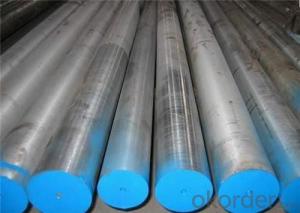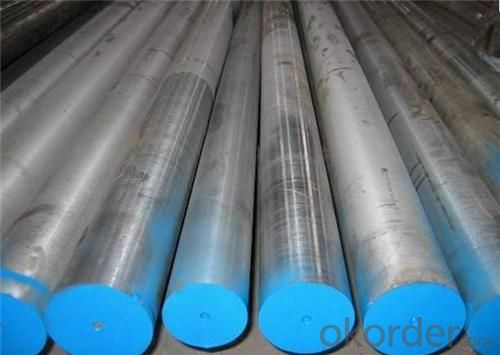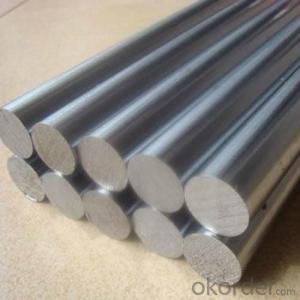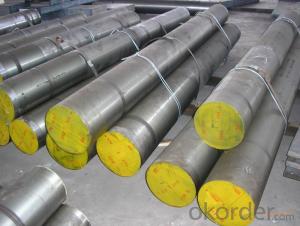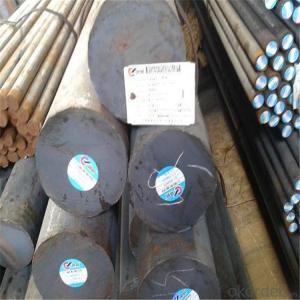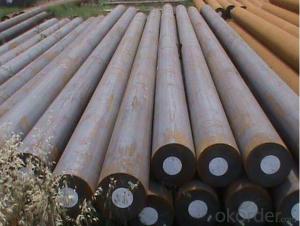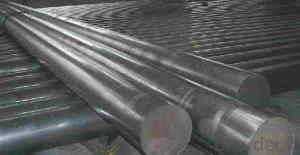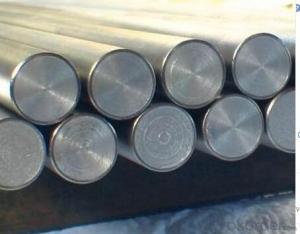High Quality Round Bar Bearing Steel Gcr15/SAE 52100
- Loading Port:
- China main port
- Payment Terms:
- TT OR LC
- Min Order Qty:
- 500 m.t.
- Supply Capability:
- 10000 m.t./month
OKorder Service Pledge
OKorder Financial Service
You Might Also Like
Specifications:
1) Grade: Bearing steel SAE 52100 / GCr15 round bars
2) Diameter: 20-500mm
3) Hot rolled/forged, annealed
Application:
Bearing steels are the most important special steels for the manufacturing of rolling elements and bearing rings.
The high-carbon chrome bearing steels are widely used in transmission shaft rollers and sleeves for auto,construction machinery, inter combustion engine manufacturing,electrical locomotive,machine tool,tractor,steel rolling equipment,drilling machinery and others.
Carburized bearing steels are mainly used in railway locomotives and wind power field.The self-developed high-grade bearing steels are acknowledged by lots of famous bearing companies in the world.
Packaging & Delivery
Mark: Heat No. will be cold stamped and Steel grade, diameter (mm), length (mm), and the manufacturer LOGO and weight (kg) is painted.
Standard seaworthy packing or as customer required
Delivery time: Within 30 days after order is confirmed.
- Q: What are the most common alloys used in special steel?
- The most common alloys used in special steel include stainless steel, tool steel, and high-speed steel.
- Q: Can special steel be used in the energy sector?
- Indeed, the energy sector can utilize special steel. This term encompasses a range of high-performance alloys that are specifically crafted for applications necessitating exceptional strength, durability, and resistance to corrosion and extreme temperatures. These qualities render special steel an optimal choice for numerous components employed in the energy sector. Within the oil and gas industry, special steel is frequently employed in the construction of pipelines, drilling equipment, and offshore platforms. Its robustness and resistance to corrosion guarantee the integrity and reliability of these vital structures, even in challenging environments. Special steel is also extensively employed in power generation plants. For instance, in thermal power plants that generate steam for electricity production, special steel is employed in the production of boiler tubes and pressure vessels. The extraordinary heat resistance and structural integrity of special steel ensure the secure and efficient operation of these components, even under high temperatures and pressure. Moreover, special steel finds applications in the renewable energy sectors, such as wind and solar power. In the case of wind turbines, special steel is utilized in the manufacturing of rotor shafts, gears, and bearings, all of which undergo substantial mechanical loads. Similarly, in concentrated solar power plants, special steel is employed for the construction of heat exchangers, receivers, and storage systems. Overall, the presence of special steel in the energy sector plays a pivotal role in enhancing the performance, safety, and longevity of various components and structures. Its exceptional properties make it an indispensable material, supporting the infrastructure and operations of the energy industry.
- Q: What are the main factors affecting the toughness of special steel?
- The toughness of special steel is influenced by several main factors, namely its composition, microstructure, and heat treatment. Composition is a key determinant of toughness, as certain alloying elements like chromium, molybdenum, nickel, and vanadium can enhance the steel's toughness by forming solid solutions or precipitates that impede crack propagation and improve fracture resistance. Microstructure also plays a significant role in determining toughness. The size, shape, and distribution of different phases in the steel, such as ferrite, pearlite, bainite, and martensite, impact its toughness. Fine-grained microstructures generally exhibit higher toughness due to their increased resistance to crack propagation. Heat treatment is another essential factor for controlling toughness. By subjecting the steel to heating and cooling processes, its microstructure can be altered, thereby affecting toughness. Common heat treatments like quenching, tempering, and annealing are employed to enhance steel toughness. For instance, quenching and tempering can produce a microstructure that possesses a desirable balance of hardness and toughness. Additional factors that can influence toughness include the presence of impurities, non-metallic inclusions, and residual stresses. Impurities and inclusions can act as stress concentrators, reducing the steel's toughness. Furthermore, residual stresses, which may arise during manufacturing, can create regions of high stress that initiate crack formation and impact toughness. In conclusion, the factors of composition, microstructure, heat treatment, impurities and inclusions, and residual stresses are crucial in determining the toughness of special steel. Understanding and controlling these factors are vital for optimizing the toughness and performance of special steels in various applications.
- Q: What are the different surface defects in special steel?
- There are several different surface defects that can occur in special steel. Some of the common defects include: 1. Scale: Scale is a thin layer of oxide that forms on the surface of steel during the manufacturing process. It can appear as a flaky or powdery substance and can be caused by exposure to high temperatures or improper cooling. Scale can affect the appearance and quality of the steel surface. 2. Pitting: Pitting is the formation of small, localized holes or depressions on the surface of the steel. It can be caused by corrosion, improper cleaning or surface preparation, or exposure to harsh environments. Pitting can weaken the steel and make it more susceptible to further corrosion. 3. Scratches: Scratches are physical marks or indentations on the surface of the steel. They can occur during handling, transportation, or processing of the steel. Scratches can affect the appearance and integrity of the steel surface and may need to be repaired or removed. 4. Roll marks: Roll marks are impressions or patterns left on the steel surface during the rolling process. They can appear as lines, grooves, or ridges and can be caused by uneven pressure or improper alignment of the rolling equipment. Roll marks can affect the surface smoothness and may require additional processing or polishing to remove. 5. Inclusions: Inclusions are foreign particles or substances that are embedded within the steel. They can be caused by impurities in the raw materials or contamination during the manufacturing process. Inclusions can weaken the steel and may lead to cracks or fractures. 6. Decarburization: Decarburization is the loss of carbon from the surface layer of the steel. It can occur during heating or annealing processes, and it can result in reduced hardness and strength of the steel surface. Decarburization is usually undesirable in special steel as it affects its performance. These are just some of the surface defects that can occur in special steel. It is important to identify and address these defects to ensure the quality and performance of the steel product.
- Q: What are the environmental impacts of manufacturing special steel?
- Manufacturing special steel has significant environmental impacts due to its energy-intensive production process and the extraction of raw materials. The production of special steel requires high temperatures and uses large amounts of fossil fuel-based energy, resulting in substantial greenhouse gas emissions contributing to climate change. Additionally, the extraction of iron ore and other raw materials for steel production can lead to deforestation, habitat destruction, and water pollution. The disposal of steel waste and byproducts also poses challenges, as it can contaminate soil and water sources. Therefore, the environmental impacts of manufacturing special steel must be carefully managed and mitigated through sustainable practices and technologies.
- Q: What are the different heat treatment processes for special steel?
- There are several different heat treatment processes for special steel, including annealing, quenching, tempering, case hardening, and precipitation hardening.
- Q: How does nitriding improve the wear resistance of special steel?
- The wear resistance of special steel is greatly enhanced through the process of nitriding, which involves infusing nitrogen atoms into the steel's surface to create a hardened layer known as nitride. This nitride layer is extremely tough and can withstand abrasive forces and friction, thereby increasing the steel's durability. The enhanced wear resistance of nitrided special steel can be attributed primarily to the formation of iron nitride (Fe3N) within the nitride layer. Iron nitride possesses a high level of hardness, typically ranging from 800 to 1000 HV (Vickers hardness), which is significantly greater than the hardness of the steel's base material. This contributes to the improved wear resistance. Moreover, the nitride layer formed during nitriding also augments the surface hardness of the steel, rendering it more resistant to deformation and indentation, which are common causes of wear in materials subjected to friction and abrasion. In addition, the nitride layer acts as a protective barrier, safeguarding the underlying steel against chemical reactions, oxidation, and corrosion. This barrier prevents the steel from deteriorating when exposed to harsh environments, moisture, and chemicals, thereby further enhancing its wear resistance. Ultimately, the process of nitriding enhances the wear resistance of special steel by creating a hardened nitride layer that is both exceptionally hard and resistant to wear, while also serving as a protective barrier. Consequently, the lifespan and durability of the steel are significantly prolonged, making it an ideal choice for applications that require high wear resistance, such as cutting tools, gears, and automotive components.
- Q: How does special steel contribute to improving product performance?
- Special steel contributes to improving product performance in several ways. Firstly, special steel has superior strength and durability compared to regular steel, making it more resistant to wear, corrosion, and impact. This increased durability ensures that products made with special steel have a longer lifespan and can withstand harsh conditions, ultimately enhancing their performance and reliability. Additionally, special steel can be tailored to have specific characteristics, such as high temperature resistance or magnetic properties, which can be crucial for certain applications. By using special steel, manufacturers can create products with enhanced functionality, efficiency, and safety, ultimately leading to improved overall performance.
- Q: What are the different methods of preventing stress relaxation in special steel?
- There are several methods of preventing stress relaxation in special steel. One method is through heat treatment, specifically through the process of annealing. Annealing involves heating the steel to a specific temperature and then slowly cooling it down. This process helps to relieve internal stresses within the steel and prevent stress relaxation. Another method is through the use of stress relieving techniques. These techniques involve applying controlled amounts of stress to the steel, typically through cold working or mechanical deformation. By doing so, the steel is able to release any built-up stress and prevent relaxation over time. Additionally, the use of alloying elements can also help prevent stress relaxation in special steel. Certain alloying elements, such as molybdenum and chromium, can improve the steel's resistance to stress relaxation by enhancing its strength and stability. Lastly, proper design and engineering of components can also play a role in preventing stress relaxation. By considering factors such as load distribution, material thickness, and stress concentration points, engineers can minimize the risk of stress relaxation in special steel applications. Overall, a combination of heat treatment, stress relieving techniques, alloying elements, and thoughtful design can be employed to prevent stress relaxation in special steel.
- Q: What are the different aerospace grades of special steel?
- There are several aerospace grades of special steel that are commonly used in the aerospace industry. These grades are specifically designed to meet the high-performance requirements and stringent safety standards of aerospace applications. Some of the different aerospace grades of special steel are: 1. 300M: This grade of steel is known for its exceptional strength and toughness. It is commonly used in aircraft landing gears, structural components, and other high-stress applications. 2. 4340: 4340 steel is a widely used alloy steel in aerospace applications. It has high strength and good hardenability, making it suitable for gears, shafts, and other critical components. 3. 17-4 PH: This stainless steel grade offers a combination of high strength, corrosion resistance, and good toughness. It is commonly used in aerospace applications such as aircraft engine components, landing gears, and structural parts. 4. 15-5 PH: Similar to 17-4 PH, 15-5 PH stainless steel also offers high strength and corrosion resistance. It is often used in aerospace applications where weight reduction is crucial, such as aircraft structural components. 5. 300 series stainless steels: Grades like 301, 302, and 304 are commonly used in aerospace applications due to their excellent corrosion resistance, low magnetic permeability, and good strength-to-weight ratio. These steels are used in aircraft structures, fuel tanks, and other components exposed to harsh environments. 6. Titanium alloys: While not technically steel, titanium alloys are widely used in aerospace applications due to their exceptional strength, low density, and high corrosion resistance. Grades like Ti-6Al-4V are commonly used in aircraft structures, engine components, and landing gears. These are just a few examples of the different aerospace grades of special steel used in the industry. Each grade offers specific properties and characteristics that make them suitable for various applications in the aerospace field.
Send your message to us
High Quality Round Bar Bearing Steel Gcr15/SAE 52100
- Loading Port:
- China main port
- Payment Terms:
- TT OR LC
- Min Order Qty:
- 500 m.t.
- Supply Capability:
- 10000 m.t./month
OKorder Service Pledge
OKorder Financial Service
Similar products
Hot products
Hot Searches
Related keywords
